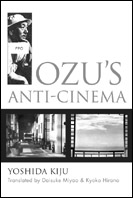Ozu’s Anti-Cinema
by Jasper Sharp
Newly translated, Ozu's Anti-Cinema throws the body of work of "the most Japanese of directors" into a whole new light. Aside from being the first Japanese look at his work to be translated into English, it is of double interest due to the background of his writer. Yoshida was one of the most significant filmmakers of the Japanese New Wave movement of the 1960s, with his most famous work being Eros Plus Massacre in 1969. The agenda of the New Wave was to rail against established studio-based filmmaking practices, with their conservative focus on tradition and family values, to bring the focus onto the youth, politics and to capture the dynamism of a society in a state of flux. Ozu, by far the most popular director of his day, was seen to embody everything wrong with the contemporary filmmaking culture, and thus became a suitable target for the critical writings of the New Wave filmmakers.
Yoshida's book begins anecdotally with his two meetings with the master director. The first was shortly after Yoshida had published an article criticising Ozu's The End of Summer (1961) for trying to cater to a younger audience that he didn't properly understand. At a party after the publication of this piece, Ozu silently snubbed Yoshida, ending their meeting with the characteristically oblique comment "After all, film directors are like prostitutes under a bridge, hiding their faces and calling their customers".
Their second meeting was at Ozu's deathbed, when Ozu's parting words to Yoshida were "Cinema is drama, not accident". Yoshida's book sees him pondering Ozu's last words to him decades after the incident, using them as a basis to revisit and reinterpret the director's films. The end results are a fascinatingly readable reappraisal of Ozu's life and philosophy from a director who initially came from a fundamentally diametrically opposed viewpoint, which attempts to get to the heart of just why Ozu's films are so enduringly powerful to this day.
